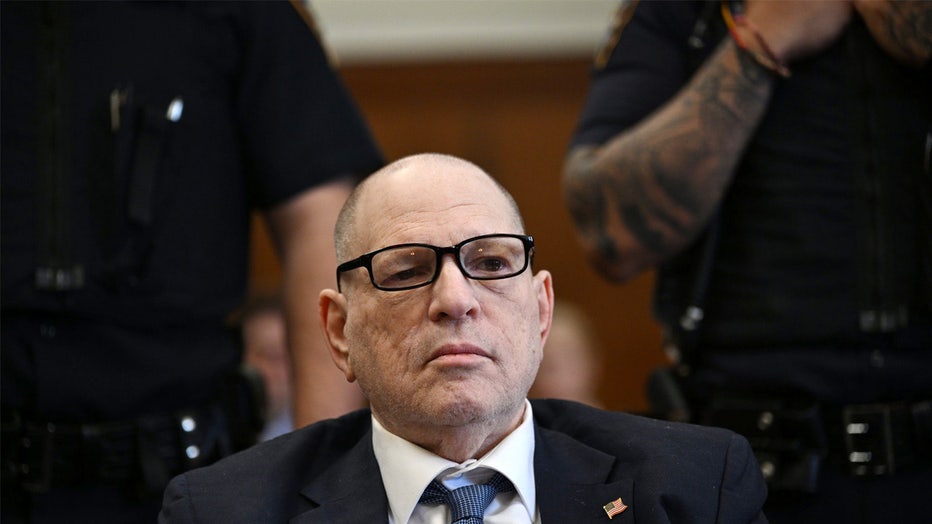Jury selection begins in Harvey Weinstein's rape retrial
Jury selection begins in Harvey Weinstein retrial
Jury selection began Tuesday in Harvey Weinstein's retrial in New York. The last time a New York jury sat in judgment of Weinstein, the ex-movie studio boss was convicted of rape and sentenced to 23 years in prison. But New York’s highest court overturned that conviction.
NEW YORK (AP) - The last time a New York City jury sat in judgment of Harvey Weinstein, the ex-movie studio boss was convicted of rape and sentenced to 23 years in prison.
Five years later, that landmark #MeToo verdict is gone — wiped away on appeal — and Weinstein is set to go on trial again. Jury selection began Tuesday, though no jurors have been seated yet.
What we know:
Weinstein, now 73 and in frail health, appeared in court in a wheelchair wearing a blue suit and tie. He carried what appeared to be a manuscript. The courtroom filled with prospective jurors Tuesday afternoon as the selection process got underway.
Weinstein faces two counts of criminal sex act and one count of rape. Two of the accusers were part of the original 2020 trial, while a third alleged victim has been added to this retrial. Prosecutors are seeking a new conviction that would keep Weinstein behind bars for years.
Judge Curtis Farber has set aside at least four days for jury selection. Opening statements could begin by the end of the week, with testimony expected to follow shortly after.
The backstory:
New York’s highest court, the Court of Appeals, overturned Weinstein’s conviction and ordered a new trial, finding that improper rulings and prejudicial testimony tainted his original one in 2020.

NEW YORK, NEW YORK - APRIL 9: Former film producer Harvey Weinstein appears for a pre-trial hearing in Manhattan Supreme Court for a hearing as his case on April 9, 2025 in New York City. Weinstein was first convicted of first-degree criminal sexual
That ruling gave Weinstein a second chance to fight the charges and do so in a different atmosphere than his first trial, which was held in the middle of a global reckoning over sexual misconduct.
Weinstein, 73, who has pleaded not guilty and denies that he raped or sexually assaulted anyone, is older and more frail, in and out of the hospital regularly for a variety of health problems. He's now far removed from when he was among the most powerful men in the movie business.
Even if he is acquitted, he will not walk free.
Weinstein's lawyer: 'We feel much better this time because of the vibe in the US'
Arthur Aidala, defense attorney for Harvey Weinstein, discusses Weinstein's health and likely outcomes for the upcoming retrial.
Weinstein is also appealing a 2022 rape conviction in Los Angeles. His 16-year prison sentence in that case still stands, though his lawyers said he needs to be resentenced because the since-vacated New York conviction factored into how his punishment was calculated.
Weinstein is being retried on two charges from his original trial. He is accused of raping an aspiring actor in a Manhattan hotel room in 2013 and performing a criminal sex act by forcing oral sex on a movie and TV production assistant in 2006.
He is also charged with one count of criminal sex act based on an allegation from a woman who was not a part of the original trial. That woman, who has asked that she not be named publicly, alleges that Weinstein forced oral sex on her at a Manhattan hotel.
What they're saying:
Speaking outside the courthouse on Tuesday, that accuser's lawyer, Lindsay Goldbrum, said one thing would become "crystal clear" from her client’s upcoming testimony at the trial: "This was not consensual. This was sexual assault with force."
"I am confident that there will be justice in this case," Goldbrum told reporters, adding that her client was resolved to testify. "It is important for women everywhere and for people who are victims of sexual assault everywhere that others pave the way and show their dedication in this fight against sexual assault."
"We're going to do the best we can to make sure anyone who's going to sit on the jury does not have any preconceived notions or predisposed ideas... and that they only base their verdict on the evidence that they're going to hear during this currently two-month-long trial," said Weinstein’s defense attorney, Arthur Aidala.
How will jury selection work?
Dig deeper:
Selecting a jury will involve bringing in around 80 potential jurors at a time for two basic screening questions. The first group was brought in late Tuesday morning after defense lawyers and prosecutors ironed out some last-minute loose ends.
The judge will ask for a show of hands from anyone who has work, family or other obligations that will prevent them from serving. He'll then ask for a show of hands from anyone who feels they can’t be impartial based on the nature of the charges or news coverage.
Anyone who raises a hand will be sent home, Farber has said.
Those who remain will be seated in or near the jury box, 24 at a time, and asked additional questions about things like their education, work, and whether anyone they know is in law enforcement or has been a victim of a crime.
Prosecutors and Weinstein’s lawyers will each have 40 minutes to question each subset of 24 potential jurors. Often, lawyers will use that time to follow up on things raised in earlier questioning or zero in on concerns about potential biases.
Either side can ask the judge to dismiss a potential juror. If too many jurors are dismissed, another group will be brought in and the process will repeat until the full jury is seated.

